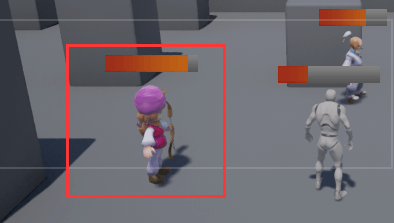ue4-插件开发
编写ue4插件
1. 直接从Editor中生成一个空的插件模板
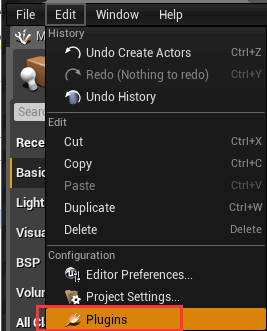
然后最右下角
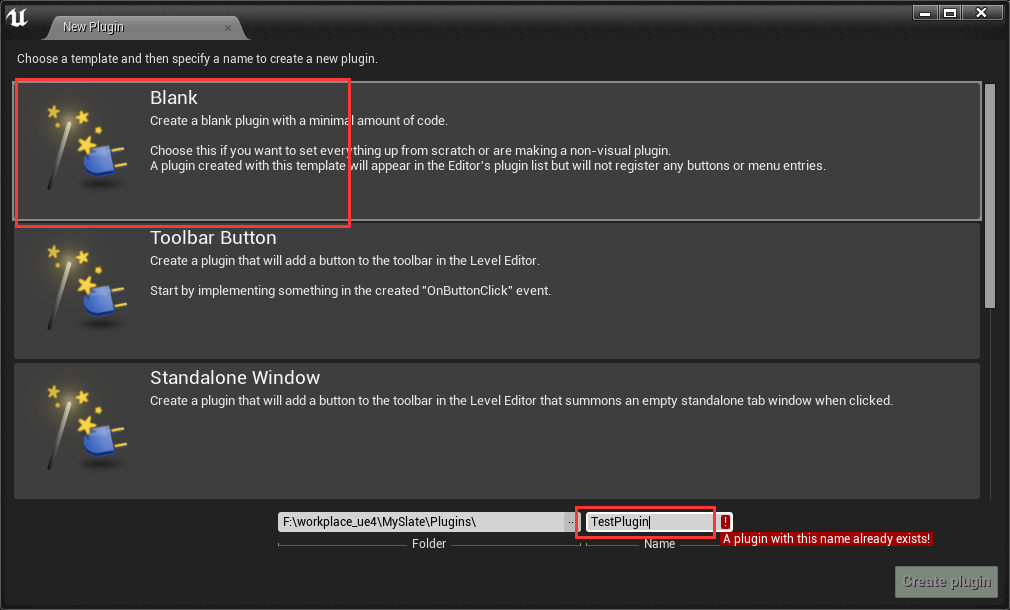
2. 关掉vs,右键生成一下工程文件,把Plugins扫进去
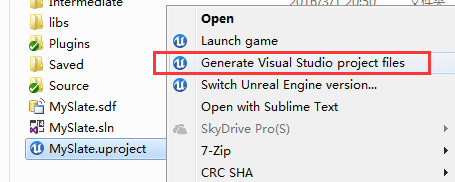
打开解决方案开始编写插件
瞧,插件加进来了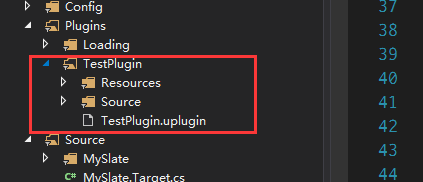
3. 编写插件
首先把插件的配置文TestPlugin.uplugin件改一下(被这个坑了两天)
这个LoadingPhase的值默认为Default,必须修改为PreDefault,不然重启Editor会报关联不上插件源码的错误,切记!
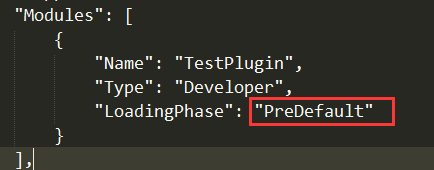
修改编译模块配置TestPlugin.Build.cs文件,c#文件
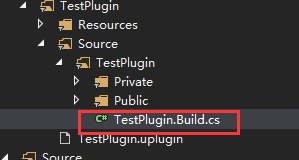
- 详细代码,里面有注释
1
2
3
4
5
6
7
8
9
10
11
12
13
14
15
16
17
18
19
20
21
22
23
24
25
26
27
28
29
30
31
32
33
34
35
36
37
38
39
40
41
42
43
44
45
46
47
48
49
50
51
52
53
54
55
56
57
58
59
60
61
62
63
64
65
66
67
68
69
70
71
72
73
74
75
76
77
78
79
80
81
82
83
84
85
86using UnrealBuildTool;
using System.IO; //路径获取需要用到IO
public class TestPlugin : ModuleRules
{
private string ModulePath //当前TestPlugin.Build.cs文件所在的路径
{
get { return Path.GetDirectoryName(RulesCompiler.GetModuleFilename(this.GetType().Name)); }
}
private string ThirdPartyPath //这个插件引用的第三方库的目录
{
get { return Path.GetFullPath(Path.Combine(ModulePath, "../../ThirdParty/")); }
}
private string MyTestLibPath //第三方库MyTestLib的目录
{
get { return Path.GetFullPath(Path.Combine(ThirdPartyPath, "MyTestLib")); }
}
public TestPlugin(TargetInfo Target)
{
PublicIncludePaths.AddRange( //公有文件搜索路径
new string[] {
"TestPlugin/Public"
// ... add public include paths required here ...
}
);
PrivateIncludePaths.AddRange(
new string[] {
"TestPlugin/Private" //私有文件搜索路径
// ... add other private include paths required here ...
}
);
PublicDependencyModuleNames.AddRange(
new string[]
{
"Core"
// ... add other public dependencies that you statically link with here ...
}
);
PrivateDependencyModuleNames.AddRange(
new string[]
{
"CoreUObject",
"Engine",
"Slate",
"SlateCore",
// ... add private dependencies that you statically link with here ...
}
);
DynamicallyLoadedModuleNames.AddRange(
new string[]
{
// ... add any modules that your module loads dynamically here ...
}
);
LoadThirdPartyLib(Target); //加载第三方库
}
public bool LoadThirdPartyLib(TargetInfo Target)
{
bool isLibrarySupported = false;
if ((Target.Platform == UnrealTargetPlatform.Win64) || (Target.Platform == UnrealTargetPlatform.Win32))//平台判断
{
isLibrarySupported = true;
System.Console.WriteLine("----- isLibrarySupported true");
string PlatformSubPath = (Target.Platform == UnrealTargetPlatform.Win64) ? "Win64" : "Win32";
string LibrariesPath = Path.Combine(MyTestLibPath, "Lib");
PublicAdditionalLibraries.Add(Path.Combine(LibrariesPath, PlatformSubPath, "TestLib.lib"));//加载第三方静态库.lib
}
if (isLibrarySupported) //成功加载库的情况下,包含第三方库的头文件
{
// Include path
System.Console.WriteLine("----- PublicIncludePaths.Add true");
PublicIncludePaths.Add(Path.Combine(MyTestLibPath, "Include"));
}
return isLibrarySupported;
}
}
- 详细代码,里面有注释
写个自定义的char – TestChar,继承自Character
先看下文件结构,需要蓝图可见的必须丢到Public下

先修改预编译头文件TestPluginPrivatePCH.h,必须包含CoreUObject,不然编译不过,切记!
1
2
3
4
5
6
7
// UObject core
// Actor based classes头文件,正常编写自定义的类一样
1
2
3
4
5
6
7
8
9
10
11
12
13
14
15
16
17
18
19
UCLASS()
class ATestChar : public ACharacter
{
GENERATED_BODY()
public:
// Sets default values for this character\'s properties
ATestChar();
UPROPERTY(EditAnywhere, Category = "Test Char")
int32 mAge;
UPROPERTY(EditAnywhere, Category = "Test Char")
FString mName;
};cpp文件,包含的是预编译文件和类的头文件
1
2
3
4
5
6
7
8
9
ATestChar::ATestChar() : Super()
{
mAge = myPrint("hello world", 123); //第三方库中的方法
mName = "yangx";
}第三方库打成了一个静态库TestLib.lib
TestLib.h
1
2
3
4
5
6
7
8
int myPrint(std::string _name, int _age);TestLib.cpp
1
2
3
4
5
6
int myPrint(std::string _name, int _age)
{
return _age + 1000;
}
4. 编译运行,在Editor中create一个Blueprint继承自这个TestChar类
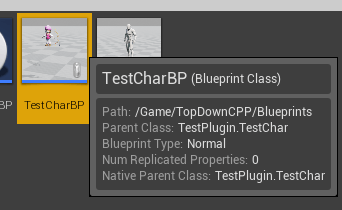

5. 拖到场景运行游戏
